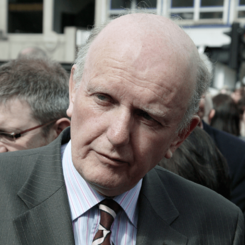Michael McGimpsey facts for kids
Quick facts for kids
Michael McGimpsey
|
|
|---|---|

Michael McGimpsey at a 2011 rally for the murdered police officer Ronan Kerr
|
|
| Minister of Health, Social Services and Public Safety | |
| In office 8 May 2007 – 16 May 2011 |
|
| First Minister | Peter Robinson |
| Preceded by | Office suspended Last incumbent: Bairbre de Brún |
| Succeeded by | Edwin Poots |
| Member of the Northern Ireland Assembly for Belfast, South |
|
| In office 25 June 1998 – 7 May 2016 |
|
| Preceded by | New Creation |
| Succeeded by | Christopher Stalford |
| Member of Belfast City Council |
|
| In office 19 May 1993 – 5 May 2011 |
|
| Preceded by | Dixie Gilmore |
| Succeeded by | Catherine Curran |
| Constituency | Laganbank |
| Personal details | |
| Born | 1 June 1948 Donaghadee, Northern Ireland |
| Nationality | British |
| Political party | Ulster Unionist Party |
| Spouse | Maureen McGimpsey |
| Children | 2 |
| Residence | Newtownards |
| Alma mater | Trinity College, Dublin |
| Profession | Businessman |
Michael McGimpsey (born 1 July 1948) is a former politician from the Ulster Unionist Party (UUP). He was a Member of the Northern Ireland Assembly (MLA) for Belfast South. He served in this role from 1998 until 2016.
Contents
About Michael McGimpsey
Early Life and Work
Michael McGimpsey was born in Donaghadee, County Down, Northern Ireland. He went to Regent House Grammar School and then to Trinity College, Dublin. Besides being a politician, he also worked as a businessman. He was involved in property and hotels.
In the 1980s, Michael and his brother Christopher became well-known. They challenged the Anglo-Irish Agreement in court. This agreement was a treaty between the British and Irish governments. They argued it went against parts of the Irish Constitution. Their case was heard in the High Court of the Republic of Ireland and later the Supreme Court. However, their legal challenge was not successful.
Starting in Politics
Michael McGimpsey began his political career in 1993. He was first elected to the Belfast City Council. In 1998, he was elected to the Northern Ireland Assembly for South Belfast.
From 1999 to 2002, he served as the Minister of Culture, Arts and Leisure. This was part of the Northern Ireland Executive, which is like the government for Northern Ireland. During his time as minister, an important historical document called the Ulster Covenant was made available online.
Elections for the UK Parliament
Michael McGimpsey also ran in elections for the UK Parliament. These elections decide who represents areas in the main UK government.
2001 Election
In 2001, he tried to become the UUP candidate for Belfast South. He ran against the sitting Member of Parliament (MP), Martin Smyth. McGimpsey received 43% of the votes from his party. However, Smyth was chosen as the candidate.
2005 Election
In 2005, Martin Smyth retired. Michael McGimpsey was then chosen as the UUP candidate for South Belfast. This was for the 2005 United Kingdom general election.
The Democratic Unionist Party (DUP) also put forward a candidate, Jimmy Spratt. This was the first time in over 20 years they had done so in this area. Some well-known UUP members were seen with the DUP candidate. This caused some confusion among voters.
In the end, the votes were split between three main parties. Social Democratic and Labour Party politician Alasdair McDonnell won the seat. This showed how important it was for parties to work together in elections.
2010 Election
In December 2009, Michael McGimpsey decided not to run in the 2010 UK General Election. He felt he could better help people by continuing his work as Minister for Health.
2007 Assembly Election
In the 2007 Northern Ireland Assembly election in March 2007, Michael McGimpsey kept his seat. However, his party, the UUP, saw fewer votes in South Belfast. Their support dropped from 27.0% in 2003 to 18.4% in 2007. This meant the UUP lost one of its seats in the area. That seat was then won by Anna Lo from the Alliance Party.
His Role in the Ulster Unionist Party
Michael McGimpsey was known to be close to David Trimble, who was a former leader of the Ulster Unionist Party. At one point, some people thought McGimpsey might become a future leader of the party. However, he never actually ran for the leadership position. He was seen as being on the more progressive side of the Ulster Unionists.
 | Laphonza Butler |
 | Daisy Bates |
 | Elizabeth Piper Ensley |

